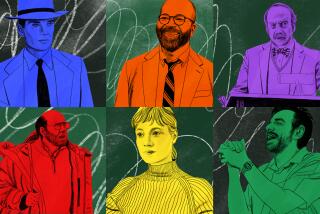Post ‘Graduate’ work is a failure
- Share via
When last we saw Benjamin Braddock and Elaine Robinson, they were sitting in the back of a Santa Barbara city bus, flush with the excitement of escape.
That’s one of the defining pop culture images of its era, made iconic by Mike Nichols’ 1967 film “The Graduate”: Benjamin in his torn Windbreaker and Elaine in her wedding dress, the troubled past behind them and their lives together about to begin. Such a scene speaks to possibility -- the possibility to construct one’s experience, to break with tradition, to get what we really want.
And yet, for all that we associate this image with the 1960s, it’s more a comment on the America of the 1950s, with its buttoned-down conformity, its suburban stifling of the soul. Benjamin and Elaine, after all, were not originally creations of the movies, but of writer Charles Webb, whose novel “The Graduate” appeared in 1963.
That’s a long time ago now, before the Kennedy assassination, before Haight-Ashbury, before Vietnam became a quagmire and then a metaphor for everything we lost. Webb, in other words, was there at the outset, and his novel evokes the cusp between two moments, the old world as it gave way to the new.
Webb is very much a product of that transition; born in 1939, he published “The Graduate” at 24 and then embarked on a peripatetic life, producing a handful of novels -- including “New Cardiff,” which inspired the movie “Hope Springs” -- turning his back on success each time it came too close.
It’s easy to see a bit of him in Benjamin, who walked away from a prestigious teaching fellowship and the advantages of his Ivy League education in search of some more elemental connection, a way of living that was more engaged. That’s the note on which “The Graduate” ends, and for 40-plus years, it’s been a perfect place to stop.
And why not? Who wants to imagine the nightmare Benjamin and Elaine faced after that bus stopped rolling and they had to step back into their lives? What about Elaine’s wedding, which Benjamin had literally pulled her out of? And their families, including Elaine’s mother, Mrs. Robinson, with whom Benjamin had slept?
The situation was so loaded that it became a source of humor; in the extended tracking shot that opens Robert Altman’s 1992 film “The Player,” Buck Henry (Oscar nominated for the screenplay for “The Graduate”) pitches “The Graduate 2” to Tim Robbins’ soulless Hollywood executive Griffin Mill.
Webb, however, must have missed Henry’s tongue-in-cheek turn in “The Player” -- or maybe he thought he could pull it off. Either way, he’s just come out with “Home School,” the sequel to “The Graduate,” although, really, it’s a sequel only in the loosest sense.
Yes, the main characters are Benjamin and Elaine, and yes, Mrs. Robinson (or “Nan,” as she is known in these pages) makes her disruptive presence felt. But these are just names, for the people here bear virtually no relation to the ones in “The Graduate.” There is no sense of development, no real tension, no notion of how we got from there to here. Indeed, it’s as if Benjamin and Elaine had been grafted onto someone else’s story, a tepid satire of the early days of the home-schooling movement, when it was illegal for parents to educate their children and school boards were adversarial to say the least.
That could have made for an interesting novel, had Webb chosen to write it; as a home schooler in the 1970s, he dealt with these kinds of situations firsthand. But “Home School” doesn’t want to be a book about home schooling any more than it wants to be a true sequel -- it’s a shoddy effort all around.
Taking place in the mid-1970s, 11 years after “The Graduate,” the story begins with a plan cooked up by Benjamin to have his mother-in-law seduce the local principal so he and Elaine can keep their school-age sons at home. “You do realize we can go to prison for this,” Elaine says by way of protest, even as she goes along.
Webb, of course, is trying to be funny, much as he was in the earlier book. But if in “The Graduate” his humor naturally grew out of the characters and their interactions, here it’s almost entirely forced.
Mrs. Robinson may be many things, but she’s not a woman who would entrap someone at her son-in-law’s request. And Benjamin, after having spent much of “The Graduate” struggling against her, would never collude with her in such a way.
That’s a serious issue, one that ruins “Home School’s” credibility. But this is such a bad book on so many levels that credibility is the least of our concerns.
Want to know about the fallout from Benjamin’s affair with Mrs. Robinson? You’ll have to look elsewhere because Webb barely touches on that. And what of Benjamin’s famous disgust, his sense that everything is phony, that all his honors, his achievements, are as so much smoke?
Webb makes a halfhearted attempt to tie home schooling to Benjamin’s disenchantment with his education, yet ultimately the connection remains unfulfilled. Instead, he spends much of the book offering stereotypical set pieces: the mother-in-law who won’t leave, the hippie radicals who allow their children to nurse into adolescence while railing against the hypocrisy of consumer culture and an educational system that brainwashes kids. All of this was cliche even in the 1970s; by now, it seems encased in dust. What does it have to do with these characters, we keep on asking. And why should we care about any of it?
In the end, that’s the problem with “Home School”: We don’t care because we can’t, because Benjamin and Elaine -- even Mrs. Robinson -- have been rendered flat and lifeless, caricatures with no heart.
I don’t know why Webb chose to resurrect their story, nor why, once he did so, he didn’t spend more time trying to get it right. After reading “Home School,” I wish we’d never seen Benjamin and Elaine get off that bus.
David L. Ulin is book editor of The Times.
More to Read
Sign up for our Book Club newsletter
Get the latest news, events and more from the Los Angeles Times Book Club, and help us get L.A. reading and talking.
You may occasionally receive promotional content from the Los Angeles Times.










